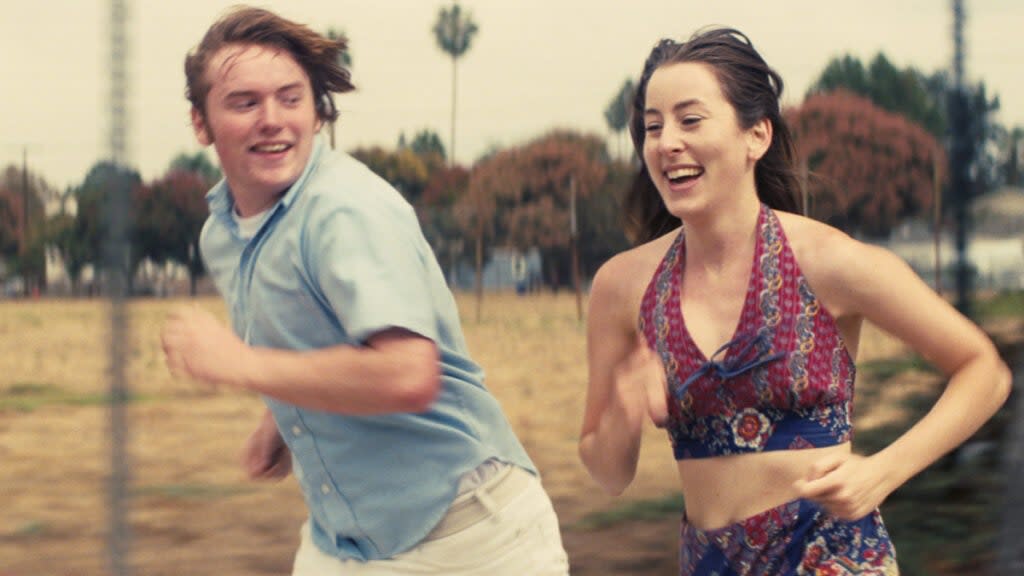
The golden haze of nostalgia meets ever-present clouds of cigarette smoke in “Licorice Pizza,” Paul Thomas Anderson’s adoringly evocative look at life in his beloved San Fernando Valley in the early 1970s.
It’s a time that Anderson recalls at least as much from the movies as he does from life — the writer-director was born in 1970 — but he’s crafted a lived-in, even tangible, period experience. You can practically smell the maraschino cherries in the cocktails and feel the shag carpeting beneath your feet.
Like so many of the memorable American films from that era, “Licorice Pizza” tells the story of an improbable romance. Alana Kane (Alana Haim) and Gary Valentine (Cooper Hoffman) have the same prickly, opposites-attract chemistry as Minnie and Moskowitz, and if they aren’t as May-December as Harold and Maude were, she’s 25 and he’s 15 when they meet, which makes them at least June-September.
It’s 1973 in Sherman Oaks, and Gary is a kid actor who’s suddenly finding himself, professionally, on the wrong side of puberty, while Alana is the youngest of three daughters and still adrift in her life. (Haim’s real-life sisters and co-members of the band Haim, Danielle and Este, play the siblings here, and their parents play their parents.) When Gary and Alana meet, he clicks into salesman mode, flirting with her until she says she might meet him at Encino’s Tail o’ the Cock bar-restaurant, where he’s a regular. He’s enough of a teenage Lothario to convince her to show up, but not so cool that he doesn’t stare at her, mouth agape, when she actually does.
That salesmanship comes into play as Gary attempts to reinvent himself as a waterbed mogul, with Alana getting swept up in his schemes as a valuable sales rep and idea person. (She’s the first one to tell him that “Soggy Bottom” is an aggressively unsexy name for a waterbed company.) The two of them come together and fall apart and come together again in Anderson’s lovely screenplay, which breaks all the rules about beats and plotting, flowing organically with sideline events, like Gary being mistakenly arrested for murder or Alana’s attraction to a young mayoral candidate played by actor-filmmaker Benny Safdie.
The valley is often the butt of jokes in Los Angeles, as it’s spiritually on the other side of the hill from where dreams come true, but geographically, it’s in the shadow of show business, as was Anderson himself as a child. (His father Ernie was legendary TV horror host Ghoulardi, as well as the guy who voiced those legendary “…on ‘The Love Boat’” spots for ABC in the ’70s and ’80s.) The writer-director’s affectionate and knowing take on show business as just another business permeates the storytelling here, from Gary’s schmoozy hustle (with everyone from casting agents to potential waterbed-buyers) to Bradley Cooper’s hilarious cameo as a vain, skirt-chasing Jon Peters to the tanned Hollywood relic (played by Sean Penn, who also grew up in this world) who tries to seduce Alana, only to forget she’s there when he gets the chance to recreate, however drunkenly, one of his fabled movie stunts.
Anderson and co-cinematographer Michael Bauman recapture the lighting and the hues that the Nixon era offered both in real life and on the screen; you could project “Licorice Pizza” side-by-side with Michael Ritchie’s mid-’70s classics “Smile” and “The Bad News Bears,” and they’d look completely of a piece. Production designer Florencia Martin, art director Samantha Englender, set decorator Ryan Watson and costumer Mark Bridges all bring the era to life from the macro (yes, that’s the TV Batmobile outside of a big event at the Palladium) to the micro (the way Alana’s ever-changing outfits reflect her search for an identity).
The film rides upon the shoulders of first-timers Haim (Anderson has directed several of her band’s videos) and Hoffman (son of frequent Anderson collaborator, the late Philip Seymour Hoffman), and they’re both thoroughly engaging. Gary’s romantic determination could easily become irritating or oppressive, but Hoffman finds the childish naivete under a façade of worldly experience. (When Penn’s star of yesteryear nuzzles Alana at Tail o’ the Cock, Gary fumes, “This is my place” as though he were Joan Crawford defending her table at Perino’s.)
Haim dazzles as a young woman trying to figure out where she wants life to take her, and she seems constantly surprised to find herself tagging along with this kid’s schemes. But whether or not she appreciates it in herself, Alana (the character) contains multitudes: She thinks on her feet, she’s an early adherent of krav maga, and her successful handling of a truck, in reverse in the San Fernando hills, shows her to be a “Smokey and the Bandit”–level driver. It’s clear that, differences aside, Alana and Gary share a determination, a need to burst forth into the world, which Anderson underscores by constantly showing them running from place to place, or at least screeching out of parking spaces.
There’s an extraordinary ensemble here (including Maya Rudolph as a casting director who realizes Gary has aged out of “cute kid” roles and Harriet Sansom Harris as an agent who praises Alana for her “Jewish nose — they’re very in-demand right now”), but it’s these two untried leads who elevate “Licorice Pizza” to the joyful, engrossing experience that it is. It’s certainly of a piece with Anderson’s filmography — the romanticism of “Punch-Drunk Love” meets the terrain of “Boogie Nights” — but it’s altogether a one-of-a-kind delight from a daring and always-surprising filmmaker.
“Licorice Pizza” opens in Los Angeles and New York City Nov. 26 and nationwide Dec. 25.
Article From & Read More ( ‘Licorice Pizza’ Film Review: Paul Thomas Anderson Casts a Loving Eye on the San Fernando Valley of the Early ’70s - Yahoo Entertainment )https://ift.tt/2YNPww3
Entertainment
Bagikan Berita Ini














0 Response to "‘Licorice Pizza’ Film Review: Paul Thomas Anderson Casts a Loving Eye on the San Fernando Valley of the Early ’70s - Yahoo Entertainment"
Post a Comment